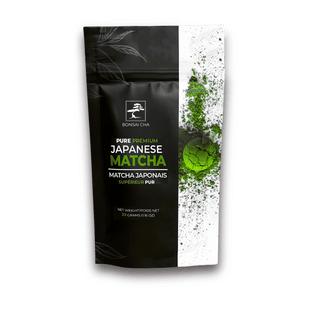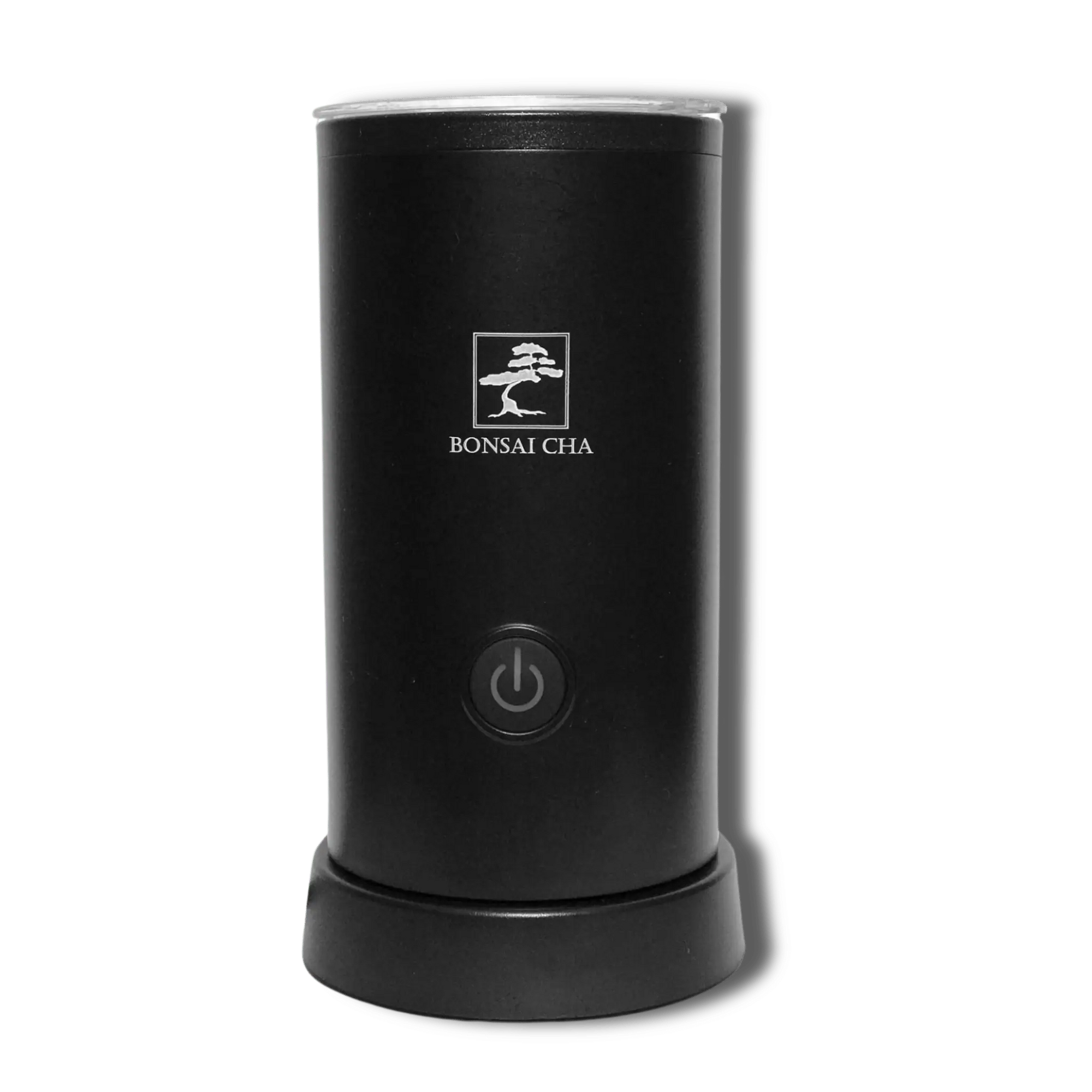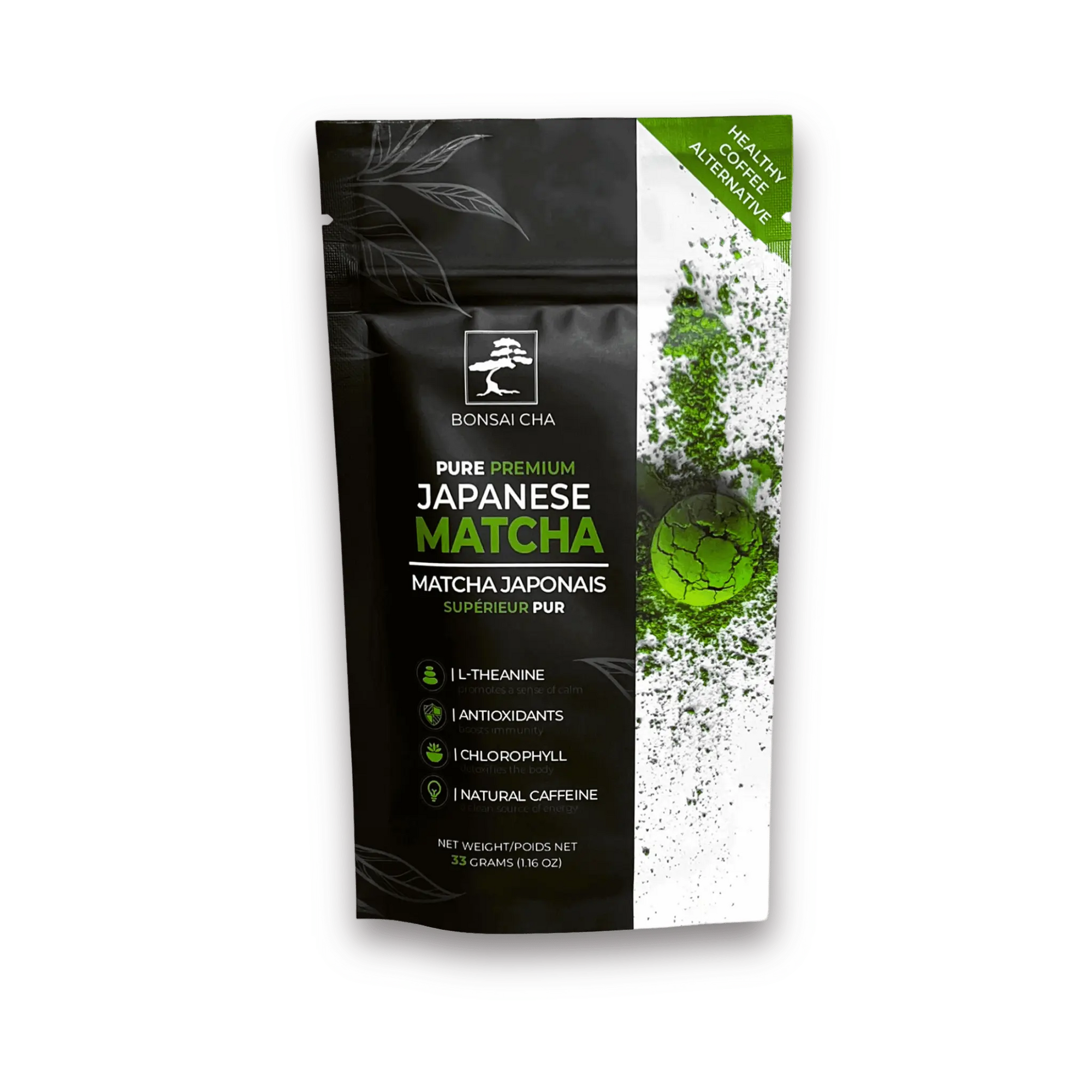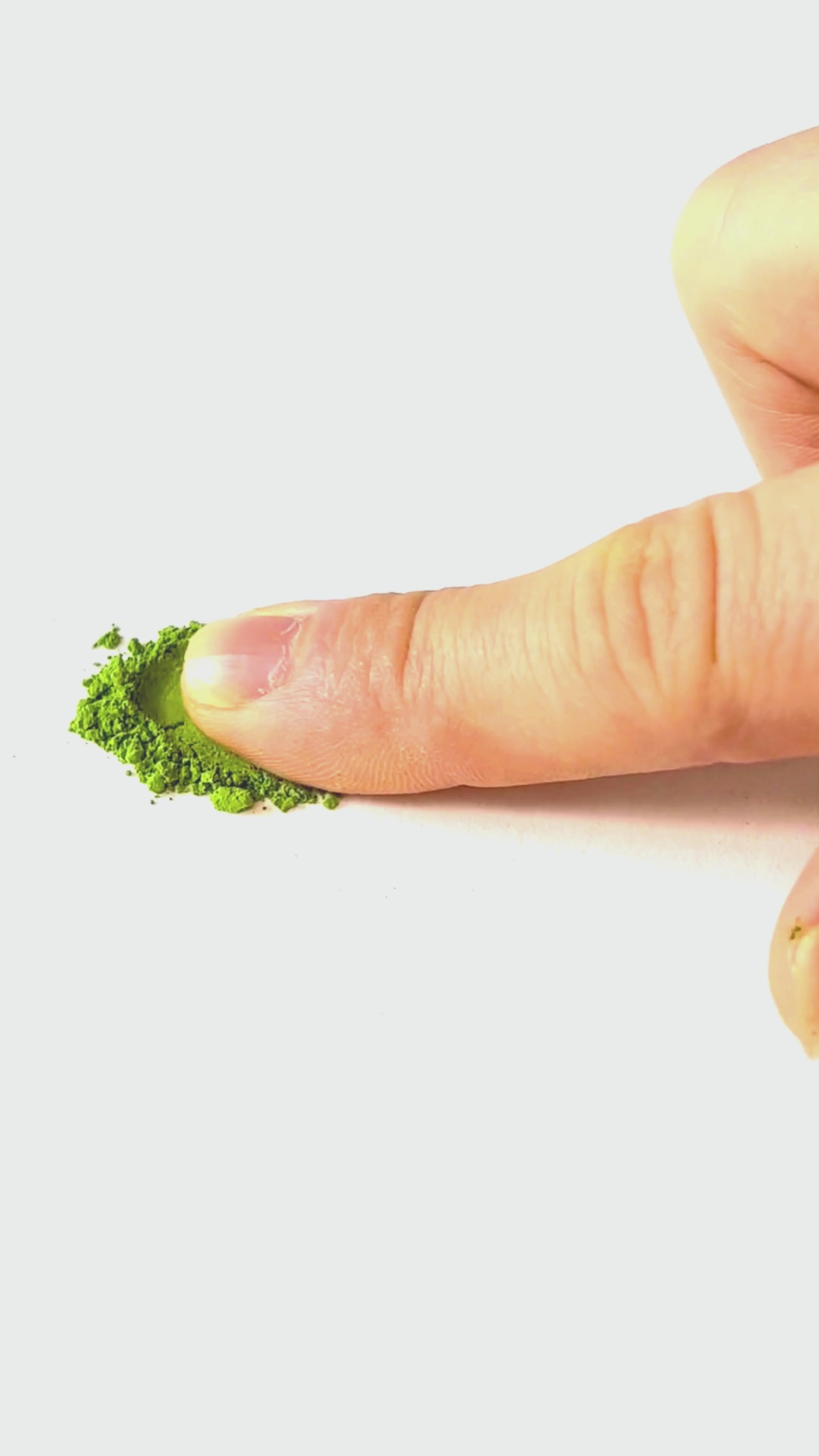Combatting Cortisol: The Morning Routines To Naturally Lower Cortisol Levels

Cortisol, often dubbed the "stress hormone," plays a vital role in our daily lives, controlling our body's response to stress and regulating our sleep-wake cycle. (1)
But here's the kicker – cortisol levels peak in the morning, giving you that jolt of alertness you need to face the day. However, when cortisol levels remain elevated, it can wreak havoc on your well-being, leading to stress, anxiety, and even health issues. (2)
To help you control cortisol levels in the morning, we'll provide some morning routines to naturally lower cortisol levels and keep them in check, right from the moment you open your eyes. These methods are not just about controlling cortisol levels in the morning, they're about nurturing your mind and body for a day filled with calm and productivity.
Don't 'Cha Wanna Be in the Know?
Join our matcha community and be the first to receive insider tips, special offers and exclusive deals delivered to your inbox.
Sleep and Cortisol
Your best morning routine actually starts the day before. You might have heard the saying, "Sleep is the best meditation." Well, it's also one of the most effective ways to rein in those early-morning cortisol spikes. Here's the science behind it.
Cortisol operates on a natural circadian rhythm, which means it follows a specific daily pattern. In the early hours, typically around 6 to 8 a.m., cortisol levels surge, providing the necessary wake-up call for your body. But if you've had a restless night, perhaps due to stress or poor sleep hygiene, this morning cortisol surge can feel more like a cortisol tsunami.
Scientific studies have shown that inadequate or disrupted sleep can lead to higher cortisol levels throughout the day (3). It's a vicious cycle: high cortisol disrupts your sleep, and poor sleep leads to even higher cortisol. This can result in chronic stress, fatigue, and a compromised ability to handle daily challenges.
So, how can you break this cycle and ensure that you wake up with cortisol levels that are in harmony with your body's needs?
Prioritize Sleep
Aim for 7-9 hours of quality rest each night, and create a bedtime routine that signals to your body that it's time to wind down (4). This might include activities like reading, gentle stretching, or meditation.
Make Your Sleeping Environment Conducive to Rest
Keep your bedroom dark, quiet, and comfortably cool. Consider investing in a comfortable mattress and pillows that support a good night's sleep (5).
Be Mindful of Caffeine and Alcohol Intake
Consuming caffeine and alcohol, especially in the hours leading up to bedtime can interfere with sleep quality and disrupt your cortisol rhythm.
By making these simple adjustments to your sleep routine, you'll be taking a significant step towards a morning with lower cortisol levels and a greater sense of well-being.

Exercising to Reduce Cortisol
Now that we've covered the importance of quality sleep, let's get moving, quite literally, to the next vital element of your cortisol-reducing morning routine: exercise.
You might be thinking, "Exercise and cortisol? Aren't workouts stressful?" Well, yes and no. It's all about the type, intensity, and timing of your exercise routine.
Exercise is a double-edged sword when it comes to cortisol. On one hand, high-intensity, prolonged workouts can temporarily elevate cortisol levels due to the physical stress they induce. However, in the long run, regular exercise has a profound impact on cortisol regulation (6).
The Cortisol Reset Button
Exercise acts like a reset button for cortisol. After an intense session, your cortisol levels may rise temporarily, but they subsequently drop, often falling lower than baseline levels. This post-exercise drop can lead to lower overall cortisol levels throughout the day.
Endorphin Release
Exercise triggers the release of endorphins, those feel-good hormones that reduce stress and enhance your mood. Morning workouts, in particular, can be effective in managing cortisol (7). When you start your day with a mood boost, you're better equipped to handle stress.
Improved Sleep
Remember our earlier discussion about the importance of sleep? Well, regular exercise can promote deeper and more restful sleep, further contributing to cortisol regulation.
The key to leveraging exercise for cortisol control is timing and moderation. Morning workouts, when cortisol levels are naturally higher, can be particularly effective in regulating this hormone. Aim for activities like yoga, brisk walks, or gentle aerobic exercises in the morning to keep cortisol in check without overtaxing your body (8).
Consistency is key. While one workout won't magically lower your cortisol levels forever, a routine that includes regular exercise can have a cumulative, long-term impact.

Mindfulness and Meditation to Reduce Cortisol
We've explored the physical aspects of cortisol management; now, let's delve into the mental side of things. Meet your morning cortisol-busting partners: mindfulness and meditation.
In today's fast-paced world, stressors are all around us. From traffic jams to overflowing inboxes, our brains are constantly bombarded with stimuli that trigger cortisol release. This is where mindfulness and meditation come to the rescue.
Mindfulness
At its core, mindfulness is about being fully present in the moment. It's the art of observing your thoughts, feelings, and sensations without judgment. By practicing mindfulness, you can become more aware of your body's stress responses and learn to manage them effectively.
Studies have shown that regular mindfulness practice can lead to decreased cortisol levels. It's like hitting the brakes on the stress train before it gains momentum. To incorporate mindfulness into your morning routine, consider dedicating a few minutes to deep, mindful breathing or a brief meditation session.
Meditation
Meditation takes mindfulness a step further. It involves deliberate focus, often on a specific object, thought, or breath. The sustained attention cultivated in meditation can help reduce stress and cortisol levels over time (9).
Scientific research has consistently demonstrated the cortisol-reducing benefits of meditation. It's not about emptying your mind of thoughts, but rather about training your mind to respond to stress in a calmer, more balanced way (10).
To get started, set aside a few minutes each morning for a simple meditation practice. Find a quiet space, sit comfortably, and concentrate on your breath. When thoughts arise (as they inevitably will), acknowledge them and gently bring your focus back to your breath.
These practices might seem deceptively simple, but their effects on cortisol levels can be profound. Over time, you'll find that you're better equipped to handle stress, and that morning cortisol surge will become more of a gentle wake-up call than a stressful jolt.

How Nutrition Impacts Cortisol Levels
Nutrition plays a significant role in managing cortisol levels, and making the right choices can set the tone for a serene day ahead. Here's the deal: what you eat in the morning can either fuel stress or ease it. To start your day on the right foot, consider these cortisol-friendly nutrition tips:
A Balanced Breakfast
Skipping breakfast or opting for sugary cereals can lead to cortisol spikes (11). Instead, choose a balanced breakfast that includes complex carbohydrates, protein, and healthy fats (12). This combination provides sustained energy and helps keep cortisol levels in check.
Limit Caffeine
While that morning cup of coffee can be a comforting ritual, excessive caffeine intake can boost cortisol production. If you're sensitive to caffeine, consider switching to decaffeinated coffee, a low caffeine option like matcha or herbal tea.
Mindful Eating
Rushed meals can contribute to stress. Take time to savor your breakfast, chew your food thoroughly, and practice mindful eating. This can reduce the perception of stress and promote relaxation (13).
Hydration
Dehydration can lead to elevated cortisol levels. Start your day with a glass of water to stay hydrated and support your body's natural processes.
Anti-Inflammatory Foods
Include foods rich in antioxidants and anti-inflammatory compounds in your morning meal. Swapping out your morning cup of coffee for matcha and complementing it with a fresh breakfast that incorporates berries, nuts, and leafy greens are excellent choices. These foods can help counteract the oxidative stress associated with high cortisol levels.
Scientific studies have highlighted the link between nutrition and cortisol regulation. A well-rounded breakfast can not only provide physical nourishment but also set a positive mental tone for the day.

Matcha's Cortisol-Reducing Power
Now that we've covered sleep, exercise, mindfulness, and nutrition, it's time to introduce you to a green elixir that's been gaining recognition for its cortisol-lowering potential - matcha.
Matcha is a vibrant green tea that's been a cornerstone of Japanese culture for centuries. Unlike regular green tea, where leaves are steeped and discarded, matcha is made from whole green tea leaves ground into a fine powder. This means you're consuming the entire leaf, unlocking a treasure trove of health benefits.
One of the standout benefits of matcha is its potential to reduce cortisol levels (14). Here's what the science says:
Studies have shown that matcha contains an amino acid called L-theanine, which has a calming effect on the brain. L-theanine promotes the production of alpha waves, associated with relaxation, while simultaneously reducing beta waves, linked to stress (15). This unique combination can help lower cortisol levels without inducing drowsiness, making it ideal for a morning routine.
The polyphenols found in matcha, particularly epigallocatechin gallate (EGCG), also play a role in cortisol regulation. EGCG has been shown to have a calming effect on the nervous system, potentially reducing the body's stress response (16).
Moreover, matcha's caffeine content, while lower than that of coffee, provides a gentle energy boost without the jitters often associated with caffeine. This steady release of energy can help you start your day on the right foot, without the cortisol spikes that sometimes accompany caffeine consumption.
Incorporating matcha into your morning routine can be as simple as whisking it into hot water or blending it into a smoothie. Its earthy, slightly sweet flavor makes it a versatile addition to various recipes.
So, if you're looking for a delicious and science-backed way to manage cortisol levels in the morning, why not give matcha a try? It might just become your new morning ritual for lower stress and heightened well-being.
Psst... Use the secret code BONSAIBLOG at checkout to
GET A FREE PREMIUM MATCHA
($33 CAD VALUE)
when you purchase any matcha powder or matcha kit
(Limited to 1 per customer)
Crafting Your Ultimate Morning Routine to Reduce Cortisol Levels
How do you create a morning routine to lower cortisol levels and take on the day with a sense of calm? Here's how to put it all together:
Rise and Shine Early
Start your day early to align with your body's natural cortisol rhythm. The gentle rise in cortisol levels upon waking helps you feel alert and focused.
Breathe and Reflect
Begin your morning by taking a few moments for deep, mindful breathing. Reflect on the day ahead and set positive intentions.
Exercise Mindfully
If you're incorporating exercise into your routine, do it with intention. Whether it's yoga, a brisk walk, or a morning jog, focus on the movement and your breath.
Nourish Your Body
Enjoy a balanced breakfast with foods that support cortisol regulation. Opt for whole grains, lean protein, and plenty of fruits and vegetables.
Sip on Matcha
Consider making matcha a part of your morning routine. Its unique combination of L-theanine, EGCG, and gentle caffeine can help you start your day with a calm, focused mind.
Practice Mindfulness
Dedicate a few minutes to mindfulness or meditation. It can set a positive mental tone for the day and help you manage stress more effectively.
Stay Hydrated: Keep yourself well-hydrated with water or herbal tea to support your body's natural processes.
Plan Your Day
Take a moment to outline your tasks and priorities. A well-organized day can reduce feelings of overwhelm and stress.
Stay Consistent
The key to a successful morning routine is consistency (17). Stick to your routine as closely as possible, even on weekends.
Adjust and Evolve
Remember that your morning routine should be adaptable. Listen to your body and make adjustments as needed to ensure it remains effective.
Everyone has a different routine and lifestyle, but we've come up with a sample schedule to give you some ideas and create your best morning to help combat cortisol levels.
Evening Sleep Schedule: Prepare for Restful Slumber
1. Evening Wind-Down (8:30 PM - 9:30 PM)
- Dim the lights: Begin reducing artificial light to signal your body that it's time to wind down.
- Screen time cut-off: Avoid screens at least an hour before bedtime to reduce exposure to blue light.
- Relaxation routine: Engage in calming activities like reading, gentle stretching, or meditation.
2. Create a Sleep-Conducive Environment (9:30 PM)
- Dark and cool room: Ensure your bedroom is dark and kept at a comfortable, slightly cool temperature.
- Comfortable bedding: Invest in a good mattress and pillows to support quality sleep.
3. Unplug and Disconnect (10:00 PM)
- Electronics off: Turn off all electronic devices and keep them out of the bedroom.
- Avoid caffeine and heavy meals: Skip caffeine and large meals close to bedtime.
5. Bedtime Ritual (10:30 PM)
- Relaxation techniques: Practice deep breathing, progressive muscle relaxation, or a short bedtime meditation.
- Consistent sleep schedule: Aim to go to bed at the same time each night to regulate your body's internal clock.
Morning Routine Before Work: Start Your Day with Focus and Energy
1. Rise and Shine (6:00 AM)
- Wake up early to align with your body's cortisol rhythm for a calm start.
- Avoid hitting the snooze button.
2. Hydration and Stretching (6:10 AM)
- Rehydrate: Begin your day with a glass of water to kickstart your metabolism.
- Gentle stretches: Incorporate light stretching exercises to wake up your muscles and improve circulation.
3. Mindful Morning Meditation (6:20 AM)
- Begin with a brief meditation session to set a positive and calm tone for the day.
- Focus on your breath and clear your mind of clutter.
4. Nutrient-Rich Breakfast (6:40 AM)
- Enjoy a balanced breakfast with complex carbohydrates, protein, and healthy fats to provide sustained energy.
- Consider incorporating matcha tea for potential cortisol regulation.
5. Exercise (7:00 AM)
- Engage in a morning workout, such as yoga or a brisk walk, to boost your energy levels and reduce cortisol.
- Keep the intensity moderate for a refreshing start.
6. Planning and Organization (7:30 AM)
- Review your daily tasks and priorities.
- Set clear goals for the day and create a to-do list.
7. Leave Time for Commute (8:00 AM)
- Ensure you have ample time to commute to work, so you don't start your day feeling rushed.
By following these evening sleep and morning routine schedules, you can optimize your sleep quality, manage cortisol levels, and approach each workday with focus, energy, and a sense of well-being.
MAKE BONSAI CHA PART OF YOUR LIFESTYLE
Sorry, there are no products in this collection
The information provided in this article is for informational purposes only and is not intended to be a substitute for professional medical advice, diagnosis, or treatment. Always seek the advice of your physician or other qualified health provider with any questions you may have regarding a medical condition. Never disregard professional medical advice or delay in seeking it because of something you have read in this article. This content is not intended to diagnose, treat, cure, or prevent any disease.
References
- Chrousos, G. P. (2009). Stress and disorders of the stress system. Nature Reviews Endocrinology, 5(7), 374-381.
- Clow, A., & Hucklebridge, F. (2001). The circadian rhythms of the adrenal cortex. Stress, 4(1), 19-46.
- Leproult, R., & Van Cauter, E. (2010). Role of sleep and sleep loss in hormonal release and metabolism. Endocrine Development, 17, 11-21.
- Medic, G., Wille, M., & Hemels, M. E. (2017). Short- and long-term health consequences of sleep disruption. Nature and Science of Sleep, 9, 151-161.
- Griefahn, B., Künemund, C., & Bröde, P. (2001). Effects of the sleeping environment on cortisol and growth hormone levels in humans. The Science of the Total Environment, 270(1-3), 1-10.
- Hill, E. E., Zack, E., Battaglini, C., Viru, M., Viru, A., & Hackney, A. C. (2008). Exercise and circulating cortisol levels: the intensity threshold effect. Journal of Endocrinological Investigation, 31(7), 587-591.
- Hackney, A. C. (2006). Stress and the neuroendocrine system: the role of exercise as a stressor and modifier of stress. Expert Review of Endocrinology & Metabolism, 1(6), 783-792.
- Matthews, K. A., & Gallo, L. C. (2011). Psychological perspectives on pathways linking socioeconomic status and physical health. Annual Review of Psychology, 62, 501-530.
- Creswell, J. D., Lindsay, E. K., Villalba, D. K., & Chin, B. (2019). Mindfulness training and physical health: mechanisms and outcomes. Psychosomatic Medicine, 81(3), 224-232.
- Zeidan, F., Johnson, S. K., Diamond, B. J., David, Z., & Goolkasian, P. (2010). Mindfulness meditation improves cognition: Evidence of brief mental training. Consciousness and Cognition, 19(2), 597-605.
- Farshchi, H. R., Taylor, M. A., & Macdonald, I. A. (2005). Deleterious effects of omitting breakfast on insulin sensitivity and fasting lipid profiles in healthy lean women. American Journal of Clinical Nutrition, 81(2), 388-396.
- Pereira, M. A., Erickson, E., & McKee, P. (2000). Breakfast frequency and quality may affect glycemia and appetite in adults and children. Journal of Nutrition, 130(2), 377S-381S.
- Daubenmier, J., Kristeller, J., Hecht, F. M., Maninger, N., Kuwata, M., Jhaveri, K., ... & Epel, E. (2011). Mindfulness intervention for stress eating to reduce cortisol and abdominal fat among overweight and obese women: an exploratory randomized controlled study. Journal of Obesity, 2011, 651936.
- Unno, K., Furushima, D., Hamamoto, S., Iguchi, K., Yamada, H., Morita, A., ... & Nakamura, Y. (2018). Stress-reducing function of matcha green tea in animal experiments and clinical trials. Nutrients, 10(10), 1468.
- Nobre, A. C., Rao, A., & Owen, G. N. (2008). L-theanine, a natural constituent in tea, and its effect on mental state. Asia Pacific Journal of Clinical Nutrition, 17(S1), 167-168.
- Singh, B. N., Shankar, S., & Srivastava, R. K. (2011). Green tea catechin, epigallocatechin-3-gallate (EGCG): Mechanisms, perspectives and clinical applications. Biochemical Pharmacology, 82(12), 1807-1821.
- Gardner, B., Lally, P., & Wardle, J. (2012). Making health habitual: the psychology of 'habit-formation' and general practice. British Journal of General Practice, 62(605), 664-666.











